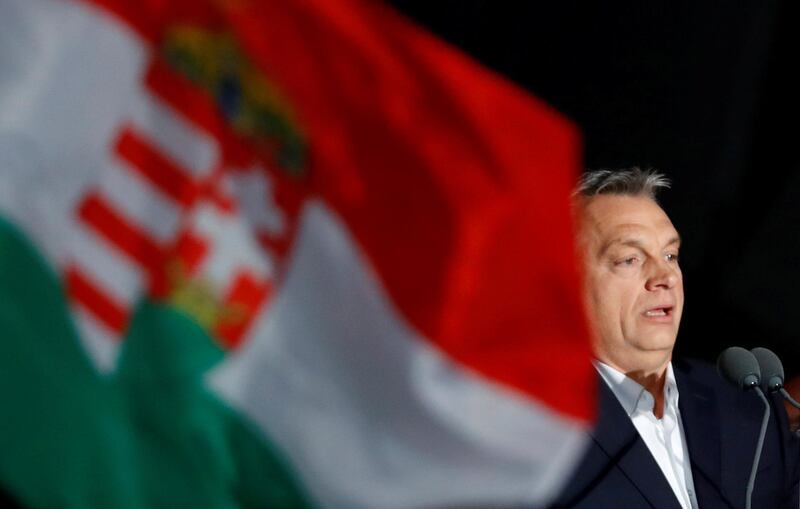Hungary's nationalist Prime Minister Viktor Orban claimed a "historic victory" on Sunday as his right-wing party took the lead in the country's key parliamentary election.
With more than 93.3 per cent of votes counted, his Fidesz party won 48.94 per cent of the vote, the National Election Office (NVI) said, putting the 54-year-old premier on track for a third consecutive term in office.
Voter turnout had reached 68.80 per cent, up more than seven points on elections in 2014, NVI said.
Addressing flag-waving supporters late on Sunday, Mr Orban said the result gave Hungarians “the opportunity to defend themselves and to defend Hungary”.
The crowd cheered as a giant TV screen showed electoral maps of the country almost covered in Fidesz's orange colour.
At end of his speech, Mr Orban led the crowd in singing a song from the country's 1848 revolution, Long Live Hungarian Freedom.
_______________
Read more:
[ Orban almost certain of fourth term as Hungary votes ]
_______________
One supporter, 53-year-old Eva Halasz, said: “Viktor is the only leader for Hungary. This proves he has the nation behind him, there is no-one in this country like him, there is no opposition here.”
The surge in voter turnout was thought to be likely to favour the opposition Jobbik, a far-right party that has been moving towards the centre, and the centre-left Socialists.
However, with nearly all votes counted, results show Jobbik trailing far behind with 19.78 per cent, the Socialists on 12.35 per cent and the environmentalist LMP party on 6.89 per cent.
Jobbik's leader, Gabor Vona, may fail to win the seat he contested in the northeastern town of Gyoengyoes.
Mr Orban is likely to seize upon the results as vindication of his clashes with EU institutions over his anti-immigration policies and rejection of the EU's refugee resettlement programme, as well as his moves to suppress civil society groups.
An Orban victory will also provide a fillip for other nationalist politicians and those on the far-right around Europe who look to him as an inspiration.
France’s far-right leader Marine Le Pen tweeted her congratulations, saying the “mass immigration promoted by the EU has been rejected once again”.
Grande et nette victoire de Viktor Orban en #Hongrie 🇭🇺 : l'inversion des valeurs et l'immigration de masse prônées par l'UE sont à nouveau rejetées.
— Marine Le Pen (@MLP_officiel) April 8, 2018
Les nationaux peuvent être majoritaires en Europe aux prochaines #Européennes2019 ! MLP
Fidesz may even be on track to win its coveted two-thirds supermajority in parliament, which would grant it wide powers to press ahead with controversial measures and change the constitution
Some of the previous measures passed using this mechanism include those that have put Mr Orban on a collision course with the EU.
They include what critics call the erosion of media and judicial independence, as well as its crackdown on organisations linked to liberal US billionaire George Soros.
The Hungarian PM accuses Mr Soros, a former backer, and the organisations he funds of promoting mass Muslim and African immigration into Europe in order to undermine its Christian identity.
The last few weeks of the campaign were marked by allegations of money laundering and corruption levelled at Mr Orban’s inner circle, often published in media owned by oligarch Lajos Simicska, an erstwhile ally of the PM who fell out with him after Fidesz’s 2014 election victory.
Mr Orban avoided public debates with opponents or speaking to independent media, preferring instead to address supporters at carefully stage-managed events.
The opposition's campaign had focused on corruption and deteriorating public services, as well as the government's failure to stem a high level of emigration where the country's population has fallen below the symbolic 10 million mark.






